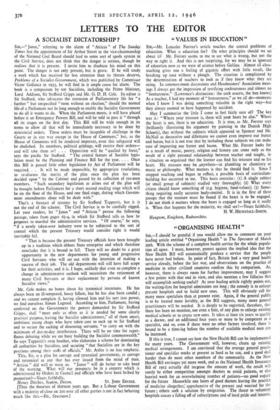VALUES IN EDUCATION"
SIR,—Mr. Lancelot Forster's article touches the central problems of education. What is education for? On what principles should we set about it? Mr. Forster seems to me to see what is wrong, but not the way to right it. And this is riot surprising, for we may be as ignorant of education now as we were of science before Galileo. Almost all class- teaching gives one a feeling of gigantic effort with little result, like breaking up land without a plough. The situation is complicated by the determination of teachers to look as if they know what they are doing. In common-room discussions and Headmasters' Association meet- ings I always got the impression of terrifying cocksureness and almost no " heMureness." (Lawrence's distinction: the cock asserts, the hen knows) As a teacher, I had my moment of " hensureness," as we all do—moments when I knew I was doing something valuable in the right way—but they always seemed to have happened by accident.
May I summarise the little I came to feel fairly sure of? The key text is: "Where your treasure is, there will yolk heart be also." Where the heart is not, there is no education. It is true, as Mr. Forster says (brilliantly illustrating his argument by pointing to the Danish High Schools), that without the subjects which appeared to Spencer and Mr. McNeil as decorative and dillettante we cannot even improve our butter and bacon, but it is not true that by including these subjects we can make sure of improving our butter and bacon. What Mr. Forster looks for as a result of music, poetry, religion and history can come only as the result of a right personal relationship between teacher and taught, in a situation so organised that the learner can find his treasure and so his heart. His treasure may be anywhere—in plumbing or chemistry or music or philosophy. What matters is that he should find it. Since I stopped teaching and began to reflect, a possible basis of curriculum-
building has occurred to me. This basis contains: (I) A single subject (or small group of subjects) studied very thoroughly; (2) What every citizen should know something of (e.g. hygiene, food-values); (3) Some- thing requiring really accurate body-control. It is in the first of these groups that the treasure must be found if the heart is to be engaged. I do not think it matters where the heart is engaged so long as it really is. When that happens for the majority, we shall see !—Yours faithfully, Hengwm, Knighton, Radnorshire.
H. W. HECKSTALL-SMITH.


























 Previous page
Previous page